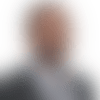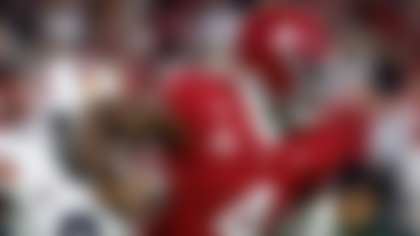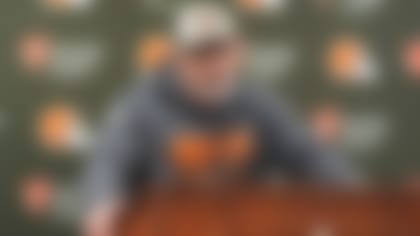When the Bears selected Justin Fields in the first round three years ago, the city of Chicago collectively celebrated. There was real consensus: The team finally got it right. After decades of futility at the position, the franchise had found its guy.
Not quite, it seems.
Chicago, in possession of the No. 1 overall pick for the second year in a row, appears ready to anoint a new QB1 in April. Caleb Williams is the universal favorite to be the first name called when the 2024 NFL Draft opens in Detroit, but fellow quarterback prospects Drake Maye and Jayden Daniels also have fans. If the Bears do indeed take a signal-caller, they will almost certainly send Fields -- still beloved by many in and out of Halas Hall -- to the highest bidder in the weeks to come.
Fields' pro career to this point has been marred by inconsistency. Some of the lows (turnovers, missed reads, sacks) have been of his own making, for sure, and typical of a young passer finding his footing in the league. But many of the valleys during his three years in Chicago can be attributed to extenuating circumstances (coaching, supporting cast, roster turnover, injuries) -- a fact not lost on Bears faithful.
Even now, with the opportunity to restart the all-important, cap-saving QB clock, there's real trepidation in the fan base about moving on from Fields. And understandably so. His natural game-changing ability is undeniable. If only his elite playmaking skills could be properly nurtured and developed, the 24-year-old could become a Pro Bowl fixture. To see that potential realized in another uniform ... Packers Super Bowl-level pain for Bears supporters.
Fields' rare combination of arm talent and mobility is why he was my preseason pick for 2023 Offensive Player of the Year (a take that, admittedly, looked far wiser during the season's second half than its first). Factor in his leadership traits, and it's an easy choice for me: I'd rather rock with No. 1 than roll the dice at No. 1 overall.
If Bears GM Ryan Poles decides he'd rather ride with Fields going forward (which, again, seems unlikely as things stand), the bounty Chicago would bring in by trading the top pick could not only set up the franchise for a deep playoff run as soon as next season, but also lead to the type of talent infusion that fuels consistent postseason appearances -- something this organization hasn't known since the 1980s. And if for whatever reason, Fields were to remain closer to his floor than his ceiling when his contract expires in two years (assuming the fifth-year option would be exercised), what should be an absolutely loaded roster (via free agency and the draft) would provide the support needed for a new quarterback to succeed.
It was shortly after the 2023 NFL Scouting Combine when Chicago agreed to deal away last year's first overall pick. Could we see something similar materialize in Indianapolis at this year's event? If so, what might a trade actually net the Bears? With the help of crack NFL Media Senior Researcher Jack Andrade, here are four realistic trade packages QB-needy teams could theoretically offer Chicago to swap spots at the top of the draft board.
A few notes before we dig in:
- The trade packages below are based on recent moves into the top five picks for QBs, which have required teams to "overpay" by approximately 20 percent on the Jimmy Johnson trade value chart. The deals also assume the No. 1 overall pick in 2024 is more valuable than the average No. 1 overall pick and will require at least a 25 percent "overpay," with the cost increasing for potential suitors the farther down the board Chicago will have to move.
- 2025 picks are valued as the 18th overall pick in the round (last non-playoff team).
- 2026 picks are valued as the 32nd overall pick in the round.


BEARS RECEIVE:
- 2024 1st-round pick (No. 2 overall) | 2,600 points
- 2024 2nd-round pick (No. 36) | 540 points
- 2024 2nd-round pick (No. 40) | 500 points
- 2024 3rd-round pick (compensatory) | ~100 points
COMMANDERS RECEIVE:
- 2024 1st-round pick (No. 1) | 3,000 points
COST: Washington pays a 25% premium (3,740 total points) to move up one spot.
We haven't had a trade up from No. 2 overall to No. 1 during the modern era, but if the Commanders want to guarantee they get their guy, and the Bears believe in Fields, this deal would give Chicago several quality swings at blue-chip prospects. After moving back one slot, I'd expect GM Ryan Poles to field even more calls from QB-needy teams trying to jump ahead of New England at No. 3, or, best case, a call from New England, allowing the Bears to gather even more assets while still ensuring they land the highest-ranked non-quarterback on their board. So in addition to the two second-rounders they'd net from Washington -- including the pick they sent the Commanders for Montez Sweat at last October's trade deadline -- the Bears could acquire another top-40 selection this year and, if they were to send something back, possibly the Patriots' first-rounder in 2025. Chicago would have the opportunity to add three to four affordable premium players who could contribute this season, while still holding multiple 1s next year.


BEARS RECEIVE:
- 2024 1st-round pick (No. 3 overall) | 2,200 points
- 2024 2nd-round pick (No. 34) | 560 points
- 2025 1st-round pick | 900 points
- 2026 3rd-round pick | 116 points
PATRIOTS RECEIVE:
- 2024 1st-round pick (No. 1) | 3,000 points
COST: New England pays a 26% premium (3,776 total points) to move up two spots.
If the Patriots' new leadership decides to make a splash for the top pick, the Bears would be wise to listen. In this scenario, Chicago would likely still be able to land consensus WR1 Marvin Harrison Jr. at No. 3 overall, pairing the dynamic pass catcher with DJ Moore to form one of the league's most dangerous receiving combos. The Bears could then stick and pick at No. 9 or package that selection, with the newly acquired second-rounder, to move up for the No. 1 tackle on the team's board. The opportunity to address two massive offensive needs with top-tier talent on team-friendly deals, while still holding multiple first-rounders in the 2025 draft, improves this squad immediately and for the future.


BEARS RECEIVE:
- 2024 1st-round pick (No. 6 overall) | 1,600 points
- 2024 2nd-round pick (No. 39) | 510 points
- 2024 3rd-round pick (No. 70) | 240 points
- 2025 1st-round pick | 900 points
- 2026 1st-round pick | 590 points
GIANTS RECEIVE:
- 2024 1st-round pick (No. 1) | 3,000 points
COST: New York pays a 28% premium (3,840 total points) to move up five spots.
Of the four scenarios, this package -- modeled after the 2012 RG3 trade -- seems the least likely, mainly because the Giants then have to solve for what to do with Daniel Jones and his contract. While Jones' massive dead cap number in 2024 all but guarantees he'll be on the Giants' roster next season, the team could move on from the former first-rounder during the 2025 offseason without incurring a debilitating financial penalty. The overlap year, while unquestionably awkward and potentially unpleasant for all involved, could allow the G-Men to progress more patiently with whichever QB they select at No. 1. If keeping both passers is untenable, perhaps a contract restructure could be negotiated to make Jones a more palatable trade chip. Moving on from Jones for the draft's top passer carries a hefty all-in price, but the team still has another 2024 second-rounder (No. 47 overall) courtesy of the Leonard Williams trade with Seattle from October.
For the Bears, the haul affords them the flexibility to move all over the top 10 for the No. 1 and, possibly, No. 2 non-QBs on their board. They will have an opportunity to get younger and more talented at multiple positions, especially at spots they are unable to address in free agency. And the extra first-rounder in 2026 could be hugely important if the decision to stick with Fields doesn't play out as hoped.


BEARS RECEIVE:
- 2024 1st-round pick (No. 8 overall) | 1,400 points
- RB Bijan Robinson | 1,120 points
- 2024 3rd-round pick (No. 74) | 220 points
- 2025 1st-round pick | 900 points
- 2026 2nd-round pick | 270 points
FALCONS RECEIVE:
- 2024 1st-round pick (No. 1) | 3,000 points
- RB Khalil Herbert | 20 points
COST: Atlanta pays a 30% premium (3,910 total points) to move up seven spots.
Trading for Fields makes a whole lot of sense for this franchise. But if the Falcons want to provide new coach Raheem Morris with the shiniest of presents (and complete the elusive QB-RB-WR-TE draft grand slam over the span of four consecutive first rounds), they could make a play for the first pick.
Modeled after Carolina's climb to the top of the draft board last year, Atlanta would have to part with its best offensive weapon in this scenario, which could be a non-starter for GM Terry Fontenot. On the flip side, would Chicago be open to making a similar deal two years in a row? The return would certainly be enticing for the Bears (imagine the read-option possibilities!), building on their biggest strength (Bijan would be a clear upgrade over Herbert, who's valued here as the first pick in Round 6) while furnishing the franchise with additional resources to revamp the roster. Acquiring Robinson and the four years of control remaining on his rookie contract (equal to 80% of his original 8th overall value) would also grant Chicago extended cap relief if Fields does reach his full potential and warrant a lucrative extension.












